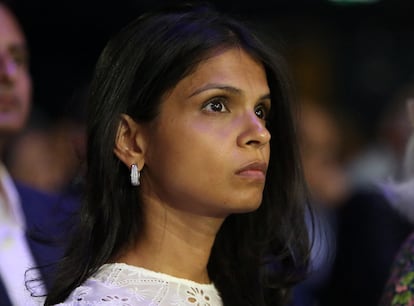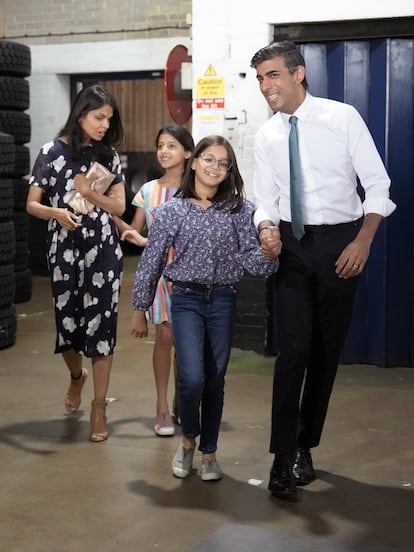Rishi Sunak’s wife Akshata Murty: From austere childhood to billionaire businesswoman
The spouse of the new British Prime Minister has a fortune that doubles that of King Charles III courtesy of a 0.91% stake in the family business and shares in six other companies


Every success story attempts to construct a version of the past that is as kind as possible, in order to justify the privileges accrued in the present. Akshata Murty, the wife of new British Prime Minister Rishi Sunak, has a personal fortune twice as large as that of King Charles III. The 42-year-old holds a stake of between 0.91% and 0.93% – valued at around $800 million – in Infosys, a technological services company founded four decades ago by a young programmer, Narayana Murthy, who would eventually become the Bill Gates of India and one of the wealthiest people on the planet.
“I often remember those first days after your birth. Your mother and I were young and struggling to get ahead in our professional careers. Two months after you were born, in Hubballi, we brought you with us to Mumbai, but we soon discovered that it was very difficult to raise a daughter and manage a career. We decided that you would spend the first years of your life with your grandparents, in Hubballi,” Narayana Murthy wrote to his daughter in 2013, in a compilation compiled by journalist Sudha Menon titled Legacy. Letters from Eminent Parents to their Daughters.
Under the care of her grandparents, Murty’s childhood was not that of a privileged young girl. Nor was it the exact opposite, but she was steeped in a self-imposed austerity through those early years of sacrifice. Her mother, Sudha Murty (both prefer to spell the family surname without the “h”), was an engineer and also a computer programmer. In fact, she became the first female engineer to be employed by Indian automobile giant Tata.
Akshata returned to Mumbai to be reunited with her parents when she was five years old, and the family’s financial situation was beginning to improve rapidly. “Life has changed for us since then, and now there is money to spare. But you know that our lifestyle will continue to be simple. I remember when I argued with your mother if we should send you to school in a private vehicle once we started to feel comfortable financially. She insisted that you and Rohan [Akshata’s younger brother] should continue to go in the same van as always with your classmates. What a friend you made there of everyone, including the driver. The simple things in life are often the happiest, and they are free,” her father wrote.
Evidently, Akshata’s life was anything but simple and free. She studied French and Economics at the exclusive but progressive Claremont McKenna College in California. Later, she enrolled in the Fashion Institute of Design & Merchandising in Los Angeles, earning a diploma in clothes manufacturing, and completed her educational career with an MBA in Business Administration from Stanford. It was there that she met her future husband, where he was studying for an MBA as a Fulbright Scholar. Four years later, in 2009, they were married in a Hindu ceremony that lasted for two days.
“It is a well-known fact that when a daughter marries, her father has mixed feelings. He hates the fact that a third party has entered the life of the daughter with whom he shares so much affection: a younger, more elegant, more self-confident man, who monopolizes attention that was previously exclusive. I too was a little jealous and sad when you told us you had found your life partner. But when I met Rishi, and confirmed all your praise for myself – brilliant, handsome and, above all, honest – I understood why he had stolen your heart,” the father of the bride admitted.

However, only Narayana’s heart was stolen. The rest of the Murty estate, which was considerably increased by Sunak’s successful business ventures, grew further still. The couple, who have two daughters, were co-owners of Catamaran Ventures UK, a venture capital firm that invests in promising companies. Before becoming an MP, Sunak transferred all of his shares in the company to his wife.
Murty has stakes in at least six other companies in the United Kingdom, including the company that makes the uniforms for the elite Eton College, attended by many UK prime ministers, including Boris Johnson. In 2021, she received nearly $14 million in dividends. Courtesy of very favorable tax laws toward top executives and globetrotting billionaires that globalization has produced, Murty paid only $36,000 in taxes in the UK that year, a ticking time bomb at a moment when Sunak, then the Chancellor of the Exchequer, was on the end of fierce criticism from the opposition Labour Party and members of his own Conservative Party over the stinginess of his budgetary measures. Eventually, the couple admitted that Murty’s tax domicile should be London and paid back taxes on her earnings.
Sunak and Murty own a five-bedroom house in the exclusive London neighborhood of Kensington valued at $8 million; an apartment in the fashionable Old Brompton Road area of the British capital; a Georgian architecture mansion in North Yorkshire, worth $1.7 million and a penthouse on the Californian coast of Santa Monica worth just over $6 million.
“I understand the curiosity I arouse because of my parents’ achievements, but I am confident that someday this business can stand on its own merits,” Murty said in a 2009 interview with The Times of India, upon launching her own fashion label and collection, Akshata Designs. Having occupied a discreet position for many years, she will now not only have to face interest in her life because of who her parents are, but even more so because of who her husband now is.
Tu suscripción se está usando en otro dispositivo
¿Quieres añadir otro usuario a tu suscripción?
Si continúas leyendo en este dispositivo, no se podrá leer en el otro.
FlechaTu suscripción se está usando en otro dispositivo y solo puedes acceder a EL PAÍS desde un dispositivo a la vez.
Si quieres compartir tu cuenta, cambia tu suscripción a la modalidad Premium, así podrás añadir otro usuario. Cada uno accederá con su propia cuenta de email, lo que os permitirá personalizar vuestra experiencia en EL PAÍS.
¿Tienes una suscripción de empresa? Accede aquí para contratar más cuentas.
En el caso de no saber quién está usando tu cuenta, te recomendamos cambiar tu contraseña aquí.
Si decides continuar compartiendo tu cuenta, este mensaje se mostrará en tu dispositivo y en el de la otra persona que está usando tu cuenta de forma indefinida, afectando a tu experiencia de lectura. Puedes consultar aquí los términos y condiciones de la suscripción digital.








































